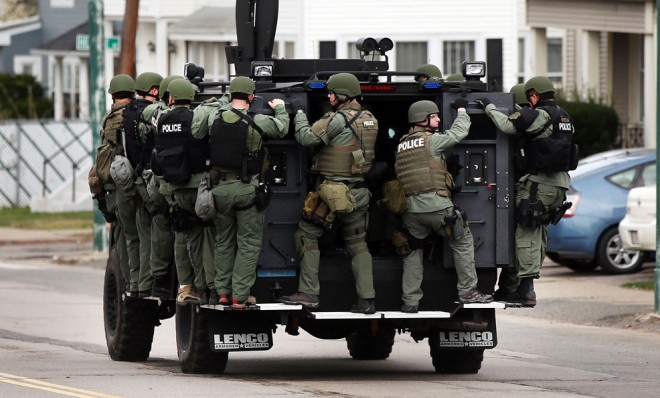Urban warfare comes to America
Despite more than a decade of fighting grueling and deadly wars abroad, many Americans didn't fully grasp the sickeningly destructive power of IEDs until last week

A free daily email with the biggest news stories of the day – and the best features from TheWeek.com
You are now subscribed
Your newsletter sign-up was successful
Just down the way from the Boston Marathon's finish line, not far from where two improvised explosive devices killed three people and injured more then 170, journalist and documentarian Sebastian Junger was getting ready to screen his new HBO documentary Which Way is the Front Line from Here? The Life and Time of Tim Hetherington. Hetherington, a photojournalist who made his name covering foreign wars, was killed in 2011 following an injury he sustained in Libya.
Hetherington died just weeks after he and Junger were nominated for an Academy Award for the 2010 documentary Restrepo, which chronicled a platoon of U.S. soldiers in Afghanistan. That movie opens with soldiers driving in a Hum-Vee while Junger is filming. Suddenly, an IED detonates and the audio cuts.
Incredibly, Restrepo's IED was the same type that detonated during the Boston Marathon, Junger told Fresh Air's Terry Gross. Both devices were made from pressure-cookers, Junger said. They were the same, except, of course, one went off in a war zone in Afghanistan's Korengal Valley and one near the end of a popular marathon right here in the United States.
The Week
Escape your echo chamber. Get the facts behind the news, plus analysis from multiple perspectives.

Sign up for The Week's Free Newsletters
From our morning news briefing to a weekly Good News Newsletter, get the best of The Week delivered directly to your inbox.
From our morning news briefing to a weekly Good News Newsletter, get the best of The Week delivered directly to your inbox.
That coincidence was enough, it seemed, to unnerve even a seasoned war journalist and documentarian like Junger.
Until last week, most Americans didn't live in a world with improvised explosive devices. We are, by and large, a people who have been insulated from the reality and the unrelenting stress of war and constant physical insecurity of conflict.
Leaving aside one-time attacks like Pearl Harbor and 9/11, America has not fought a war on its own soil since the Civil War.
Most of the United States' population does not live in the constant high-stress environment of conflict. Most of us have never been to Sudan, Afghanistan, Iraq, Libya, and Syria. Most Americans don't even think about those places much.
A free daily email with the biggest news stories of the day – and the best features from TheWeek.com
But then, with a sickening bombing last Monday and a citywide manhunt on Friday, the battle came home, and Americans across the nation sat glued to their televisions and their computer screens. We each jumped a bit at the sound of round after round of gunfire popping off. We cringed as law enforcement officers shouted to people in the background of news cameras. We sat glued to the police scanner as officers called out that there were "explosives everywhere." We held our breath as reports of grenades and IEDs ricocheted across social media. We rode along with local reporters as they hitched rides to the frontline of the skirmish. We listened as witness' cell phones crackled and cut out. We heard the reports of chaos. Some said they smelled gunpowder. Local television news was filled with the voices of Bostonians hunkered down in their homes, sounding alternately shocked, terrified, resolute, and brave.
Suddenly, and maybe only for a few hours, Americans had more in common with those faraway nations than we ever had before.
Until the Boston Marathon bombings and the ensuing manhunt, America's collective experience of urban war was limited to the stories troops brought back from abroad, or from reporters' dispatches from the front lines of a conflict. Even though America is the major player in 21st century conflict zones, what most of us know of that reality is extremely limited.
That is no longer true. Now, after an emotionally traumatic week, Americans who had never had to fear a pressure-cooker bomb, who never had to fear a hail of gunfire, are thinking about exactly these things.
For five days, the same vocabulary formerly reserved for those reporting from Kabul, Baghdad, and Misrata had to be repurposed to describe the streets of Boston, Cambridge, and Watertown, Mass.
We lived through an abridged version of a conflict. And so we experienced an abridged version of the acute stress that accompanies that reality.
If nothing else comes from the Boston Marathon tragedy, let it be not only a moment of collective resilience, but also a seized opportunity for our nation to truly empathize with people in conflict-plagued nations around the world.
We had a week, but they have had to cope with this reality every moment, every day, for years and years.
Neda Semnani is a freelance writer at work on her first book. She is the former Heard on the Hill columnist and the arts and culture reporter for CQ Roll Call. Her work has also appeared in the Washington City Paper, BuzzFeed, CityStream, and more.
-
 The environmental cost of GLP-1s
The environmental cost of GLP-1sThe explainer Producing the drugs is a dirty process
-
 Greenland’s capital becomes ground zero for the country’s diplomatic straits
Greenland’s capital becomes ground zero for the country’s diplomatic straitsIN THE SPOTLIGHT A flurry of new consular activity in Nuuk shows how important Greenland has become to Europeans’ anxiety about American imperialism
-
 ‘This is something that happens all too often’
‘This is something that happens all too often’Instant Opinion Opinion, comment and editorials of the day